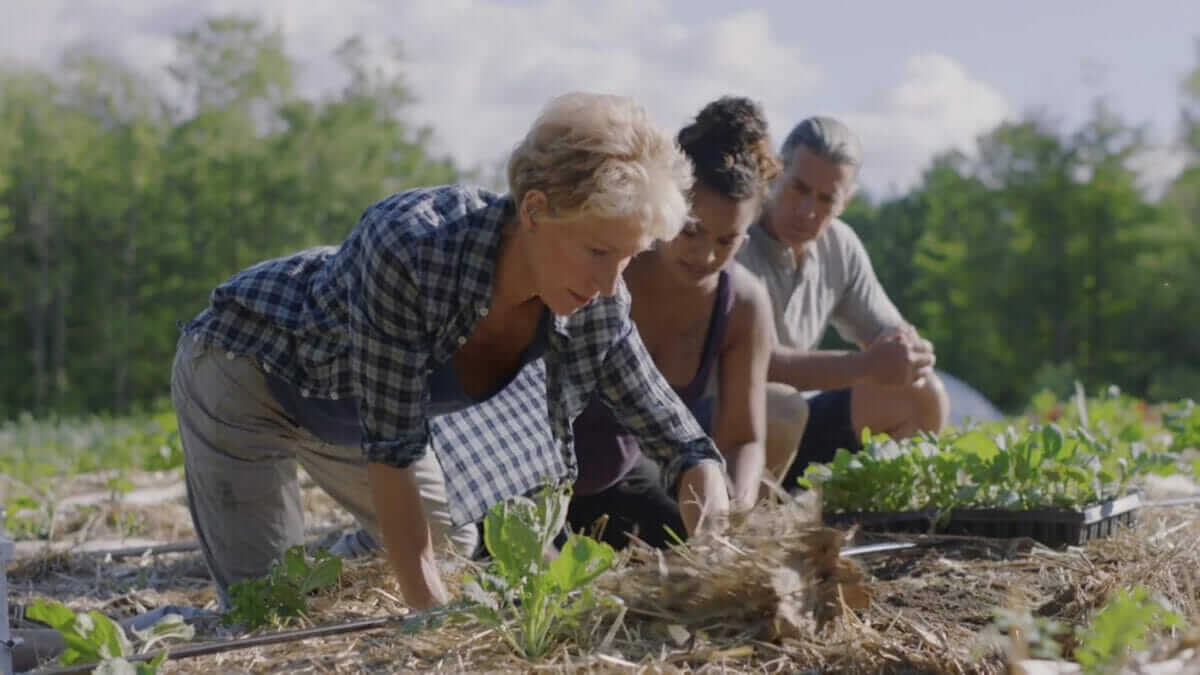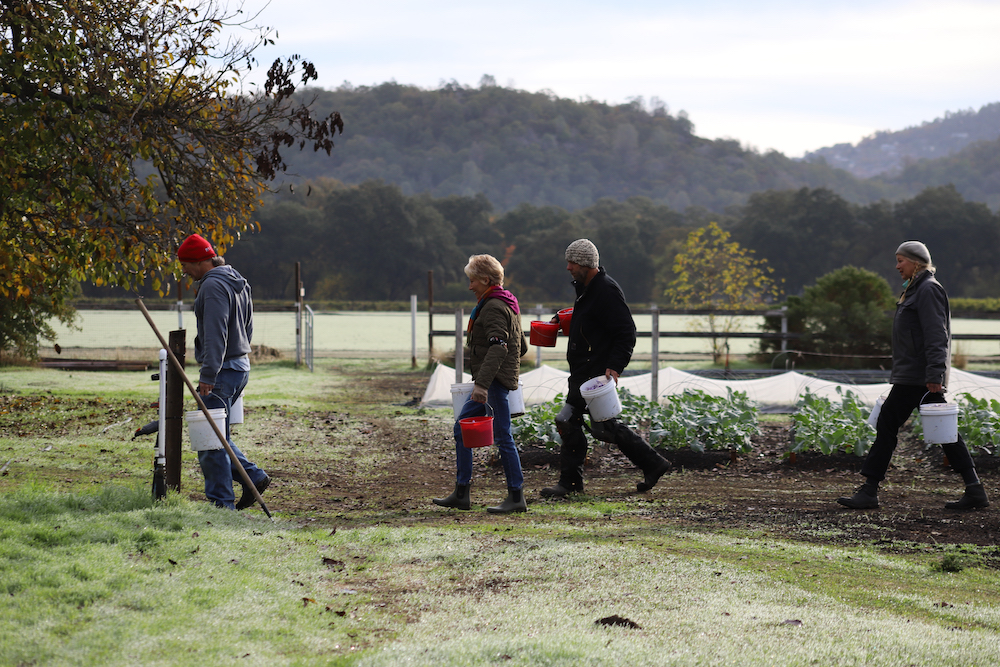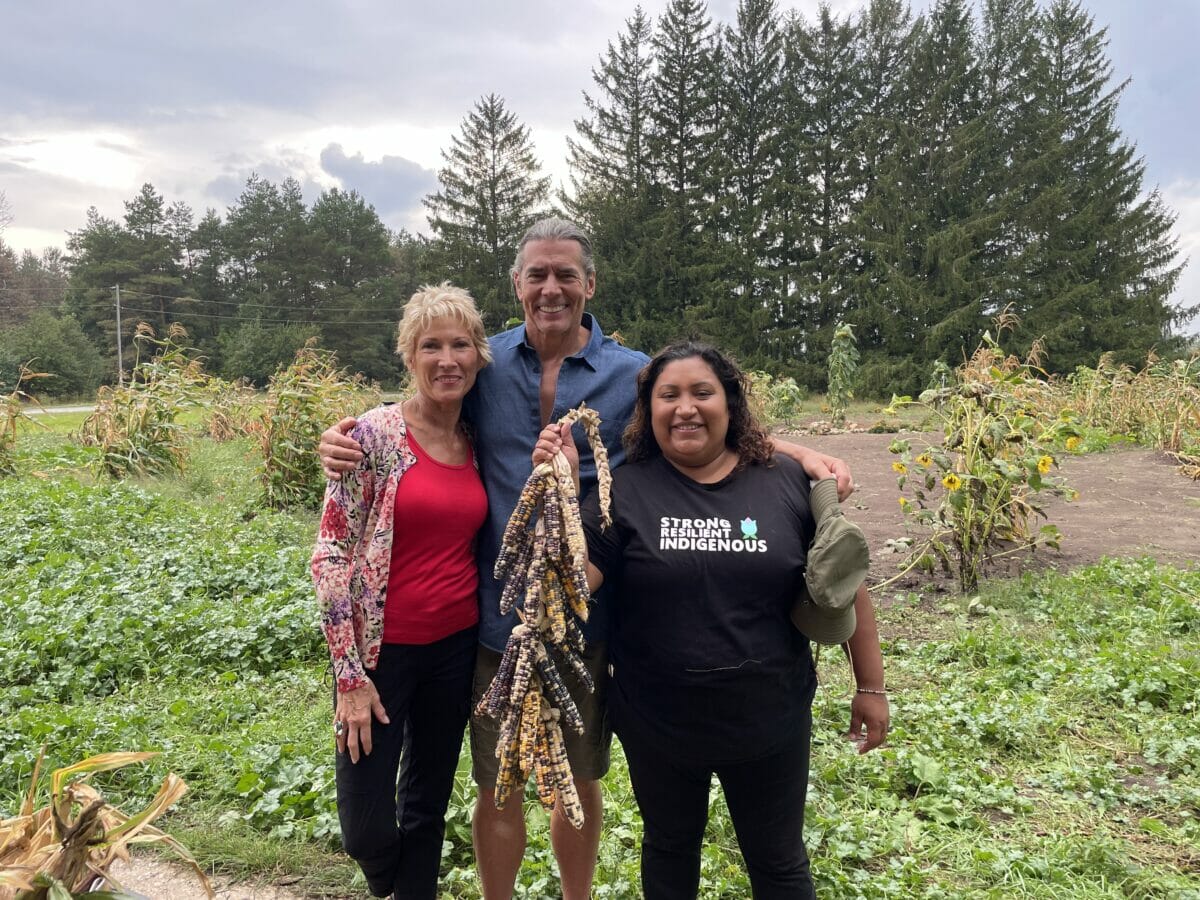Spotlight On the Show Helping US Stay Fit to Farm
GardenFit, streaming now on PBS, visits 13 farms to highlight how gardeners can tend to their bodies while cultivating their plots.
Spotlight On the Show Helping US Stay Fit to Farm
GardenFit, streaming now on PBS, visits 13 farms to highlight how gardeners can tend to their bodies while cultivating their plots.

The show visits Soul Fire Farm in New York.courtesy of PBS.
How do you feel after a long day in the garden or on the farm? You might be proud of the work you put in, or maybe you’re feeling excited about the new shoots you can see poking through the soil. But are you also a little sore and achy? Got a crick in your neck and a tightness in your shoulders? A wrenched back, creaky knees, tight hamstrings…it comes with the gardening territory.
Madeline Hooper knows your planting pain. She felt it herself, too. The longtime PR executive turned to gardening after retiring, and she has spent years cultivating her own garden in upstate New York, spending hours at a time outside. But as happy as she felt to muck about in the dirt, her body was paying the price. So a friend recommended she find a personal trainer. The next day, she called Jeff Hughes, a longtime fitness trainer for celebrity clients. “Once I started to work with Jeff, he had a chance to really understand what I was doing,” says Hooper. “And within a month, the stress, the aches, the pains, all went away, because I was moving my body better.”
Hughes’ fitness philosophy relies on building routines and following some basic guidelines. Clients have often told him he should write a book, but he jokes that “my stuff is so common sense that a book would be a pamphlet.” When asked about a universal tip that can help most backyard gardeners, his go-to piece of advice was: Pay attention to your posture. Keep your ears in line with your shoulders, shoulders in line with your hips and hips in line with your knees. Aim for that as a neutral stance, and you’ll stave off a lot of issues. Small but powerful.
Still, common sense or not, the stretches and “fixes” that Hughes prescribed to Hooper were so effective, they sparked an idea. How could they help other people with similar issues? Although Hooper is a newbie to the television world, Hughes has spent time in front of the camera before, acting in small roles on shows such as Days of Our Lives and All My Children. Taking this garden-based advice to the small screen seemed like a natural fit for the pair. From there, GardenFit was born.
Now streaming on PBS.org, the show involves Hughes and Hooper traveling to a different garden or farm in each episode. They traverse the country, meeting with farmers and gardeners who are just as passionate about the outdoors. Viewers get a tour of the different garden spaces, and the guests talk about what they grow and why. The growers speak about their physical health challenges as well as how their gardens help their mental well-being. It’s a balancing act.

There’s Peace and Plenty Farm in northern California, run by Melinda Price and Simon Avery. The couple moved from a city lifestyle to become the largest saffron growers in North America. But harvesting more than half a million saffron flowers per season is no small feat. Saffron crocuses grow fairly close to the ground, while Price and Avery both stand more than six feet tall. All that hunching and bending over was becoming a problem. “I needed to fix how they bent down and stood up, without hurting their backs,” Hughes says. “The first time he stood straight up, Simon went “Oh!” And he just got it.”
There’s also Brooke Bridges of Soul Fire Farm in New York, a community farm committed to food sovereignty and incorporating traditional African techniques to crop cultivation. While running the farm, hiking up and down 80 acres of narrow rows, Bridges was also pregnant and trying to temper her foot and ankle pain. By adding a few simple stretches and swapping out her restrictive rain boots for more comfortable sneakers, Hughes was able to make a big change for the new mom.
Throughout the season, Hooper and Hughes also visit a Japanese-style zen garden in Connecticut to help owner Bob Levine get rid of his knee pain while weeding and begin practicing Tai Chi again. At 95, Peggy Walsh is the show’s oldest guest. She starts each morning with a barefoot walk through her backyard vegetable garden. One of the largest farms they visit, Ziibimijwang Farm in northern Michigan, sits on 300 acres of tribal land. The head of the garden, Rosebud Schneider, dives into the history and meaning behind her “three sisters” crops (corn, beans and squash), finding links to her ancestors through cultivating the land.

The fixes Hughes suggests are often quick and simple. He designs them so they can be done whenever or wherever, without needing a gym or other equipment. But the goal is to enjoy your time outside, not dread the work because of how it makes you feel. “One of the reasons that we went to so many different gardens, and saw people from ages 30 to 95, in all different shapes and sizes, is we wanted to inspire people that it is that simple,” Hooper says. The pair chose guests who genuinely love gardening and would benefit from understanding how to use their bodies better. “Their body could be their best garden tool.”
After their initial visits, Hooper and Hughes return to the farms four weeks later to see how their students have taken to the lessons. In all cases, the farmers’ aches and pains are gone, and their gardens are flourishing. Hughes hopes people watching the show will recognize an issue or two that they might suffer from and work to correct it. Gardeners and farmers are already “used to doing something and being a little patient, nurturing it and watching it grow,” Hughes says. “Take four weeks and try to change a few things. I would love it if everybody started feeling better out in the field.”
For Hooper, the joy of the show is in seeing how passionate the guest farmers and gardeners are about their plots and how connected they are to their land. The show isn’t just about physical fitness, it also incorporates the mental fitness aspect of being outside, tying it all together into a holistic sense of wellness. “The solitude and the peace of working on one plant, pulling one tomato…it’s an exciting feeling that we are contributing to the planet, even in our small little space,” says Hooper, who hopes people watching see that there are no rules when gardening, as long as it makes you happy.
“All of the people we visited were trailblazers,” she says. “They really created their environment.” Viewers at home can do that, too. Plant what you like, and watch your posture. Everything else will sort itself out.
Follow us
This work is licensed under a Creative Commons Attribution-NoDerivatives 4.0 International License.
Want to republish a Modern Farmer story?
We are happy for Modern Farmer stories to be shared, and encourage you to republish our articles for your audience. When doing so, we ask that you follow these guidelines:
Please credit us and our writers
For the author byline, please use “Author Name, Modern Farmer.” At the top of our stories, if on the web, please include this text and link: “This story was originally published by Modern Farmer.”
Please make sure to include a link back to either our home page or the article URL.
At the bottom of the story, please include the following text:
“Modern Farmer is a nonprofit initiative dedicated to raising awareness and catalyzing action at the intersection of food, agriculture, and society. Read more at <link>Modern Farmer</link>.”
Use our widget
We’d like to be able to track our stories, so we ask that if you republish our content, you do so using our widget (located on the left hand side of the article). The HTML code has a built-in tracker that tells us the data and domain where the story was published, as well as view counts.
Check the image requirements
It’s your responsibility to confirm you're licensed to republish images in our articles. Some images, such as those from commercial providers, don't allow their images to be republished without permission or payment. Copyright terms are generally listed in the image caption and attribution. You are welcome to omit our images or substitute with your own. Charts and interactive graphics follow the same rules.
Don’t change too much. Or, ask us first.
Articles must be republished in their entirety. It’s okay to change references to time (“today” to “yesterday”) or location (“Iowa City, IA” to “here”). But please keep everything else the same.
If you feel strongly that a more material edit needs to be made, get in touch with us at [email protected]. We’re happy to discuss it with the original author, but we must have prior approval for changes before publication.
Special cases
Extracts. You may run the first few lines or paragraphs of the article and then say: “Read the full article at Modern Farmer” with a link back to the original article.
Quotes. You may quote authors provided you include a link back to the article URL.
Translations. These require writer approval. To inquire about translation of a Modern Farmer article, contact us at [email protected]
Signed consent / copyright release forms. These are not required, provided you are following these guidelines.
Print. Articles can be republished in print under these same rules, with the exception that you do not need to include the links.
Tag us
When sharing the story on social media, please tag us using the following: - Twitter (@ModFarm) - Facebook (@ModernFarmerMedia) - Instagram (@modfarm)
Use our content respectfully
Modern Farmer is a nonprofit and as such we share our content for free and in good faith in order to reach new audiences. Respectfully,
No selling ads against our stories. It’s okay to put our stories on pages with ads.
Don’t republish our material wholesale, or automatically; you need to select stories to be republished individually.
You have no rights to sell, license, syndicate, or otherwise represent yourself as the authorized owner of our material to any third parties. This means that you cannot actively publish or submit our work for syndication to third party platforms or apps like Apple News or Google News. We understand that publishers cannot fully control when certain third parties automatically summarize or crawl content from publishers’ own sites.
Keep in touch
We want to hear from you if you love Modern Farmer content, have a collaboration idea, or anything else to share. As a nonprofit outlet, we work in service of our community and are always open to comments, feedback, and ideas. Contact us at [email protected].by Emily Baron Cadloff, Modern Farmer
March 24, 2022
Modern Farmer Weekly
Solutions Hub
Innovations, ideas and inspiration. Actionable solutions for a resilient food system.
ExploreExplore other topics
Share With Us
We want to hear from Modern Farmer readers who have thoughtful commentary, actionable solutions, or helpful ideas to share.
SubmitNecessary cookies are absolutely essential for the website to function properly. This category only includes cookies that ensures basic functionalities and security features of the website. These cookies do not store any personal information.
Any cookies that may not be particularly necessary for the website to function and are used specifically to collect user personal data via analytics, ads, other embedded contents are termed as non-necessary cookies.